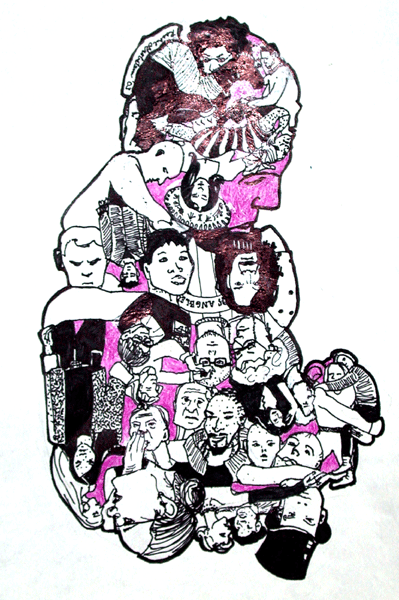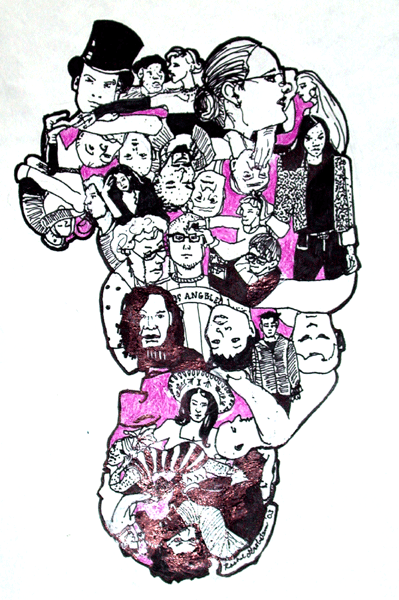Made available on Serendip
In association with Making Sense of Diversity: An Exploration, a world wide conversation
52 of us gathered to talk about what we thought about customs and traditions at Bryn Mawr. There were quite a range of experiences and reactions to them:
- "when you needed a family, it wasn't there for you"
- "my family was dysfunctional; I wasn't looking for another one here"
- I made my friends among people who shared my past experiences or interests (in a particular culture or sport or other activity), not among the "random group of people who happened to live near me"
- there are too many expectations for customs groups; students need other outlets for making friends
- it wasn't just about socialization or orientation; it was about relationships ("at a woman's collecge, everything is very relational")
- whether it "made it as a group" was "hit or miss"
- it wasn't just about "forming" a community; it was about "conforming" to an ideal community
- it had a practical function: facilitating relationships among the people you were living with: there were concrete tasks, like roomate contracts
- Tri-Co and customs "butt heads": people of color form a community at Tri-Co before other students arrive; "customs is for the white people who haven't made friends yet"
- it's important to bring together different kinds of people: Customs facilitates making initial connections, becoming friends with those who don't share your background
- could Customs become a place of support, rather than a forming/conforming/style-setting/limit-setting experience?
- is the whole problem one of "shaping" rather than simply offering support?
- it is not part of my culture to become part of an "arbitrary formal community"
- Customs is "form without meaning"
- would you rather just meet with a random group of people who promise to support you?
- Customs should "just take itself less seriously"
- we should all learn to "step outside of the Customs bubble": how about dorm socials, where bubbles could interact with one another?
- "I felt like an outcast, everytime I did something with folks not in my Customs group"
- Customs felt very superficial and forced: "I had to sneak out of my group"
- can we foster--rather than force--sisterhood?
- it seems like a "white sorority"
- there's "too much emphasis on how close you have to be"
- it's human nature to want to be in a place where you are comfortable, safe and secure: freshman want to know that there is a certain group of people they can count on to "be there"
- other colleges foster welcoming environments without these small group sororities
- the downfall of Customs is that it discourages you from seeking out other people/other groups
- why not just have a "hall of freshman"?
- you form real friendships around shared interests, something more concrete that random living arrangements
- Tri-Co is chosen, it feels natural; Customs is forced, not necessary
- does Customs feel forced (to those who did Tri-Co) because it's just repetitive, because you've already made a circle of friends?
- what about those who are not as outgoing? how to balance their needs w/ that of those who are more self-sufficient?
- when are we going to grow up, and learn to do things on our own?
- people come from very different places, and have very different needs
- I am "a slow adjuster, and would exclude myself" unless invited to join others
- some of the Customs activities (like making snowflakes?) had no use
- Customs groups need to be customized for the individuals in them
- you don't need to become bff (=best friends forever) with your Customs group
- white students are defensive about groups they can't be part of
- why isn't there a group for WASPS (isn't that most of Bryn Mawr?)
- would that include white ethnics?
- how might open campus days help to facilitate connections among students w/ shared interests?
- there needs to be better communication about some of the "forced" activities (having to eat w/ your customs group at a certain time is just an efficient measure to get 700 people fed w/in a reasonable amount of time! it's not forced intimacy!)
Central themes that arose during the conversation were these: Do we want to be more reflective about this notion that "at a woman's college, everything is relational"? Might we focus less on making the Customs group an end in itself, less protective of its borders, and more of a pass-through to other things, a stepping stone to finding a group you do feel a part of? A fall back and support system when other plans fail? Customs sounded like a cult, a group you couldn't get out of. Where does this attitude of "self-containment" come from? Who defines the "corporate nature" of a Customs group? Who sets these guidelines?
For some, Customs groups functioned as "temporary families until we found our real ones"; for others, they got in the way of finding more sustainable friendships. Must individuals defend themselves against the groups they are part of? Might we replace forming and defending groups of all kinds with just enjoying the groups we are part of? Must all groups be in competition with one another? Couldn't we each enjoy participating in several groups, w/out feeling a sense of disloyalty to one, when we engage in another?
This discussion is invited to continue on line.
"Making Sense of Diversity" will resume in person in two weeks, at noon on Friday, September 24, when Laura Kramer (BMC ), Orah Minder (BMC '06) and Deborah Harrold (Political Science Department) will lead a discussion about "Listening for Peace: The Israeli-Palestinian Struggle."
| Return to Schedule for Friday Noon Conversations

| Bryn Mawr Conversations
| Archived
Forum
| Archive of Bryn Mawr Conversation
| General Conversation
| Serendip Home |
These pages are sponsored by the Bryn Mawr College Office
of Intercultural Affairs, the Center for Science and Society and the Serendip
website. Send us additional comments or suggestions at Serendip
© by Serendip 1994-
- Last Modified:
Wednesday, 21-June-2005 15:18:00 EST

